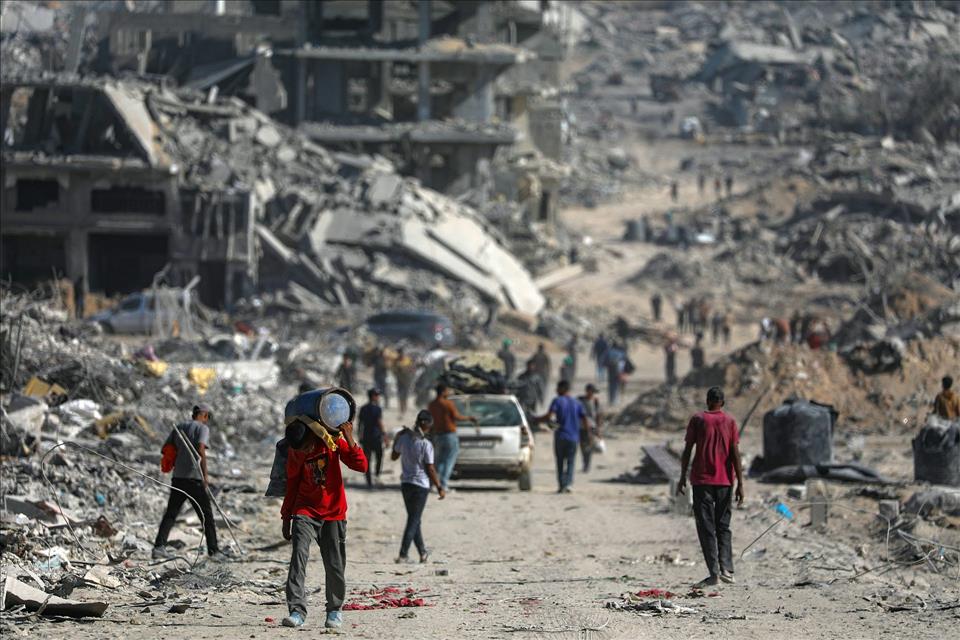
With 83% Of Its Buildings Destroyed, Gaza Needs More Than Money To Rebuild
People and empires have lived in, built on, fought over and destroyed the area for thousands of years.
The dire situation in GazaThe consequences of the Israel-Palestine war have been catastrophic.
The human toll is immense: the United Nations estimates more than 67,000 Palestinians have been killed and almost 170,000 wounded. About 1,200 Israelis have been killed and 5,400 injured since October 7, 2023.
Gaza itself has been razed to the ground in many areas. The United Nations estimates 83% of all structures and housing units have been damaged in Gaza City.
The ability of Gaza to support life is in question.
The recent ceasefire could see longer-term peace. At the time of writing it continues to hold, but optimism is not high.
If peace is to hold in the long term, there is a need to look into reestablishing the means by which Gaza can sustain its population.
Read more: Trump's 'shock and awe' foreign policy achieved a breakthrough in Gaza – but is it sustainable?
Priorities in rebuilding GazaGaza is a disaster zone. Infrastructure has been dramatically impacted.
The damage is similar in scale and scope to a Category 4 or 5 hurricane.
Like any disaster, food, medicine and bottled water are the immediate priorities. This will sustain life in the short term.
Assuming a major effort can be made to open border crossings, lives will be saved by bringing immediate relief to victims of food and medical supply shortages.
Engineers will be a key resource in reconstructing Gaza.
After sustained bombing, priorities will be reconstituting buried assets such as power, water and sewerage, and pumping stations. While the original lines of buried pipes will be known from city mapping, much of the infrastructure will be cracked, broken or destroyed.
Failure to do so will lead to outbreaks of diseases such as typhus and dysentery.
Unexploded bombs and ammunition will need clearance.
Damaged houses and public buildings will present huge public safety risks of collapse.
Massive demolition and clearance will be required for millions of tonnes of debris.
Following these immediate priorities will be the construction or repair of hospitals, houses, schools, road systems and governance infrastructure – all of which will have been massively compromised.
A daunting challengeRealistically, it will take decades to design, finance and reconstruct infrastructure in the Gaza Strip. Emergency fixes can be made in the short term (3–6 months) but winter could extract a further toll if delays occur.
Demolition requires specialist equipment and heavy goods vehicles. The required work is daunting.
Just up the coast, Beirut is facing the problem of what to do with 32 million tonnes of demolition waste from the latest Israel-Lebanon conflict, not long after rebuilding from its civil war.
Gaza may face a similar dilemma considering how much demolition waste there is on the ground.
It is likely a housing prefabrication scheme and a massive logistical effort will be needed at the least.
Historical precedents outline the scale of the rebuilding task: Stalingrad took more than 20 years to reconstitute after World War II and Warsaw did not finish postwar reconstruction until the 1980s.
Power, fuel and water issuesCreating a future Gaza is dependent on funding and access to resources.
This is more than just money – it will need materials, skills and labour on the ground.
It requires a sustainable peace, a disentanglement of existing infrastructure and a creation of new options for supply.
All critical supplies and infrastructure are not under the control of its government: power, fuel and water currently come from Israel.
Logistically, aid agencies are on the ground to maintain some services. The United Nations Relief and Works Agency (UNRWA) is foremost among these. It is a program mandated to provide basic humanitarian assistance and services to Palestinian refugees.
In two weeks in September, UNWRA provided access to 18 million litres of water to 370,000 people in Gaza, as well as removing 4,000 tonnes of solid waste.
This implies 3 billion litres of water – equivalent to filling around 1,200 Olympic swimming pools annually – and removing in excess of 600,000 tonnes of waste every year as a minimum requirement to sustain the Gazan society.
Any engineering solution will need to provide this level of support if not substantially more. This is a huge commitment for funders and engineers.
New port infrastructure needs to be developed as a priority. Supply infrastructure such as roads and ports independent of outside controls will be essential to sustain any society in a post-war setting.
Potentially, much of the demolition waste from Gaza's damaged buildings could be used to reclaim land from the sea and provide breakwaters for this.
However, this waste is heavily contaminated, creating further problems.
A challenging futureTo achieve these reconstruction outcomes simultaneously will require billions of dollars in aid over many decades.
Without serious aid coming to the region, the cost of construction materials will inevitably soar and there will be shortages of engineers and technicians accordingly.
All in all, the undertaking is likely to be a major mobilisation exercise for a number of years – no matter how much money is thrown at it by donors.

Legal Disclaimer:
MENAFN provides the
information “as is” without warranty of any kind. We do not accept
any responsibility or liability for the accuracy, content, images,
videos, licenses, completeness, legality, or reliability of the information
contained in this article. If you have any complaints or copyright
issues related to this article, kindly contact the provider above.


















Comments
No comment